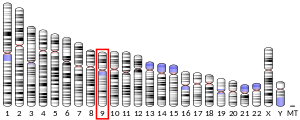Tubulin beta-4B chain formerly known as tubulin beta-2C chain is a protein that in humans is encoded by the TUBB4B gene.[5][6] It is thought that this protein could determine which hand is dominant in humans due to variations of the TUBB4B gene, which cause the protein to form microtubules that form cilia which direct fluids asymmetrically during development.[7]
References
edit- ^ a b c GRCh38: Ensembl release 89: ENSG00000188229 – Ensembl, May 2017
- ^ a b c GRCm38: Ensembl release 89: ENSMUSG00000036752 – Ensembl, May 2017
- ^ "Human PubMed Reference:". National Center for Biotechnology Information, U.S. National Library of Medicine.
- ^ "Mouse PubMed Reference:". National Center for Biotechnology Information, U.S. National Library of Medicine.
- ^ Lewis SA, Gilmartin ME, Hall JL, Cowan NJ (Jul 1985). "Three expressed sequences within the human beta-tubulin multigene family each define a distinct isotype". J Mol Biol. 182 (1): 11–20. doi:10.1016/0022-2836(85)90023-3. PMID 3999141.
- ^ "Entrez Gene: TUBB2C tubulin, beta 2C".
- ^ Kulkarni, Sumeet (2024-04-02). "Right- or left-handed? Protein in embryo cells might help decide". Nature. doi:10.1038/d41586-024-00977-x.
Further reading
edit- Burgoyne RD, Cambray-Deakin MA, Lewis SA, et al. (1989). "Differential distribution of beta-tubulin isotypes in cerebellum". EMBO J. 7 (8): 2311–9. doi:10.1002/j.1460-2075.1988.tb03074.x. PMC 457095. PMID 2461292.
- Wang D, Villasante A, Lewis SA, Cowan NJ (1987). "The mammalian beta-tubulin repertoire: hematopoietic expression of a novel, heterologous beta-tubulin isotype". J. Cell Biol. 103 (5): 1903–10. doi:10.1083/jcb.103.5.1903. PMC 2114403. PMID 3782288.
- Watts NR, Sackett DL, Ward RD, et al. (2000). "HIV-1 Rev Depolymerizes Microtubules to Form Stable Bilayered Rings". J. Cell Biol. 150 (2): 349–60. doi:10.1083/jcb.150.2.349. PMC 2180222. PMID 10908577.
- Szalay J, Bruno P, Bhati R, et al. (2001). "Associations of PKC isoforms with the cytoskeleton of B16F10 melanoma cells". J. Histochem. Cytochem. 49 (1): 49–66. doi:10.1177/002215540104900106. PMID 11118478. S2CID 41666892.
- Tarazona R, López-Lluch G, Galiani MD, et al. (2001). "HLA-B2702 (77-83/83-77) peptide binds to beta-tubulin on human NK cells and blocks their cytotoxic capacity". J. Immunol. 165 (12): 6776–82. doi:10.4049/jimmunol.165.12.6776. PMID 11120798.
- Walss-Bass C, Xu K, David S, et al. (2003). "Occurrence of nuclear beta(II)-tubulin in cultured cells". Cell Tissue Res. 308 (2): 215–23. doi:10.1007/s00441-002-0539-6. PMID 12037579. S2CID 25518226.
- Krebs DL, Uren RT, Metcalf D, et al. (2002). "SOCS-6 Binds to Insulin Receptor Substrate 4, and Mice Lacking the SOCS-6 Gene Exhibit Mild Growth Retardation". Mol. Cell. Biol. 22 (13): 4567–78. doi:10.1128/MCB.22.13.4567-4578.2002. PMC 133908. PMID 12052866.
- Strausberg RL, Feingold EA, Grouse LH, et al. (2003). "Generation and initial analysis of more than 15,000 full-length human and mouse cDNA sequences". Proc. Natl. Acad. Sci. U.S.A. 99 (26): 16899–903. Bibcode:2002PNAS...9916899M. doi:10.1073/pnas.242603899. PMC 139241. PMID 12477932.
- Chen D, Wang M, Zhou S, Zhou Q (2004). "HIV-1 Tat targets microtubules to induce apoptosis, a process promoted by the pro-apoptotic Bcl-2 relative Bim". EMBO J. 21 (24): 6801–10. doi:10.1093/emboj/cdf683. PMC 139103. PMID 12486001.
- Dozier JH, Hiser L, Davis JA, et al. (2003). "β class II tubulin predominates in normal and tumor breast tissues". Breast Cancer Res. 5 (5): R157–69. doi:10.1186/bcr631. PMC 314434. PMID 12927047.
- Trinczek B, Brajenovic M, Ebneth A, Drewes G (2004). "MARK4 is a novel microtubule-associated proteins/microtubule affinity-regulating kinase that binds to the cellular microtubule network and to centrosomes". J. Biol. Chem. 279 (7): 5915–23. doi:10.1074/jbc.M304528200. PMID 14594945.
- Ota T, Suzuki Y, Nishikawa T, et al. (2004). "Complete sequencing and characterization of 21,243 full-length human cDNAs". Nat. Genet. 36 (1): 40–5. doi:10.1038/ng1285. PMID 14702039.
- Navarro-Lérida I, Martínez Moreno M, Roncal F, et al. (2004). "Proteomic identification of brain proteins that interact with dynein light chain LC8". Proteomics. 4 (2): 339–46. doi:10.1002/pmic.200300528. PMID 14760703. S2CID 8868600.
- Campbell GR, Pasquier E, Watkins J, et al. (2005). "The glutamine-rich region of the HIV-1 Tat protein is involved in T-cell apoptosis". J. Biol. Chem. 279 (46): 48197–204. doi:10.1074/jbc.M406195200. PMID 15331610.
- Gerhard DS, Wagner L, Feingold EA, et al. (2004). "The Status, Quality, and Expansion of the NIH Full-Length cDNA Project: The Mammalian Gene Collection (MGC)". Genome Res. 14 (10B): 2121–7. doi:10.1101/gr.2596504. PMC 528928. PMID 15489334.
- Andersen JS, Lam YW, Leung AK, et al. (2005). "Nucleolar proteome dynamics". Nature. 433 (7021): 77–83. Bibcode:2005Natur.433...77A. doi:10.1038/nature03207. PMID 15635413. S2CID 4344740.
- de Mareuil J, Carre M, Barbier P, et al. (2006). "HIV-1 Tat protein enhances Microtubule polymerization". Retrovirology. 2: 5. doi:10.1186/1742-4690-2-5. PMC 549075. PMID 15691386.
- Giacca M (2006). "HIV-1 Tat, apoptosis and the mitochondria: a tubulin link?". Retrovirology. 2: 7. doi:10.1186/1742-4690-2-7. PMC 549042. PMID 15698476.
- Ahmed M, Forsberg J, Bergsten P (2005). "Protein profiling of human pancreatic islets by two-dimensional gel electrophoresis and mass spectrometry". J. Proteome Res. 4 (3): 931–40. doi:10.1021/pr050024a. PMID 15952740.
External links
edit- TUBB4B human gene location in the UCSC Genome Browser.
- TUBB4B human gene details in the UCSC Genome Browser.






